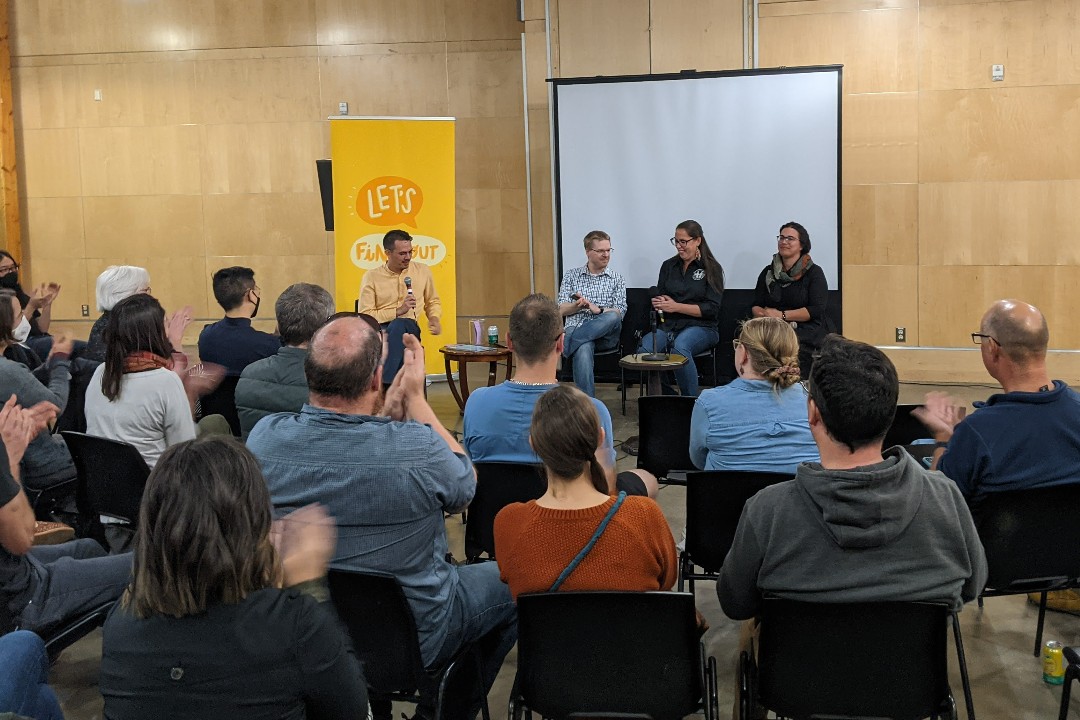The proposed national urban park in Edmonton's river valley needs to be developed with reconciliation in mind, says the Confederacy of Treaty Six First Nations.
"I think that the federal government, like many Canadians, is figuring out what reconciliation actually means," Miranda Jimmy, the confederacy's project coordinator for the national urban park initiative, told a special live taping of Let's Find Out.
The curiosity-driven history podcast wrapped up its season about Edmonton parks with a live show at the Alfred H. Savage Centre on Sept. 21. The night began with a presentation by bison conservation historian Lauren Markewicz, who explained how the creation of national parks often resulted in the displacement and erasure of Indigenous people under the guise of protecting wildlife.
Her talk was followed by a panel discussion about the national urban park initiative proposed for the river valley, of which the City of Edmonton is in the planning phase.
Reconciliation is one of three main priorities the federal government has laid out in the national urban park initiative.
"Historically, Indigenous people have not been part of the equation in the development of national parks. In fact, it's been detrimental — forced removal, forced relocation, removal of harvesting rights, ceremonial sites," Jimmy said, adding that the current government seems to be approaching national urban parks differently, and the cities that were shortlisted for the parks had demonstrated strong relationships to First Nations.
"Edmonton, from what I've been told, was chosen because the City of Edmonton has an existing memorandum of understanding with both the Confederacy of Treaty Six and the Métis Nation of Alberta," she said. "And so those provided a groundwork for the municipality to bring in Indigenous partners in a good way at the ground level."
But 18 months into the process, consultation is only just beginning, said Jimmy, who was hired in August. She said the chiefs of the confederacy's 16 member nations had yet not been briefed on the initiative and engagement with their communities had not yet taken place.

(From left) Let's Find Out host Chris Chang-Yen Phillips moderated a discussion of the proposed national urban park in Edmonton with Speaking Municipally co-host Mack Male, Miranda Jimmy of the Confederacy of Treaty Six First Nations, and public historian Lauren Markewicz at a live taping of the podcast on Sept. 21 at the Alfred H. Savage Centre. (Trevor Chow-Fraser)
Good communication and open and honest dialogue will be essential as the park moves through the planning phase, Jimmy said.
"The confederacy has to build a relationship with Parks Canada, we have to figure out how we work together, how we solve problems, how we make decisions, how we hold each other accountable," she said. "There's a bit of a honeymoon phase that happens with any relationship, and it's not until we get to those tough questions that we'll figure out how we work together."
Specific site selection, co-management or governance models, and how this all intersects with the Métis Nation are among those questions to be addressed.
According to Parks Canada, the planning phase is expected to take about a year, at which point it will come back to city council with more information on funding and governance.
The Oct. 4 episode has much more from Jimmy, as well as Taproot's Mack Male on what has happened at city hall on this file, host Chris Chang-Yen Phillips on Parks Canada's intentions, and Markewicz on the lessons we can draw from the histories of Elk Island National Park and the defunct Buffalo National Park.
